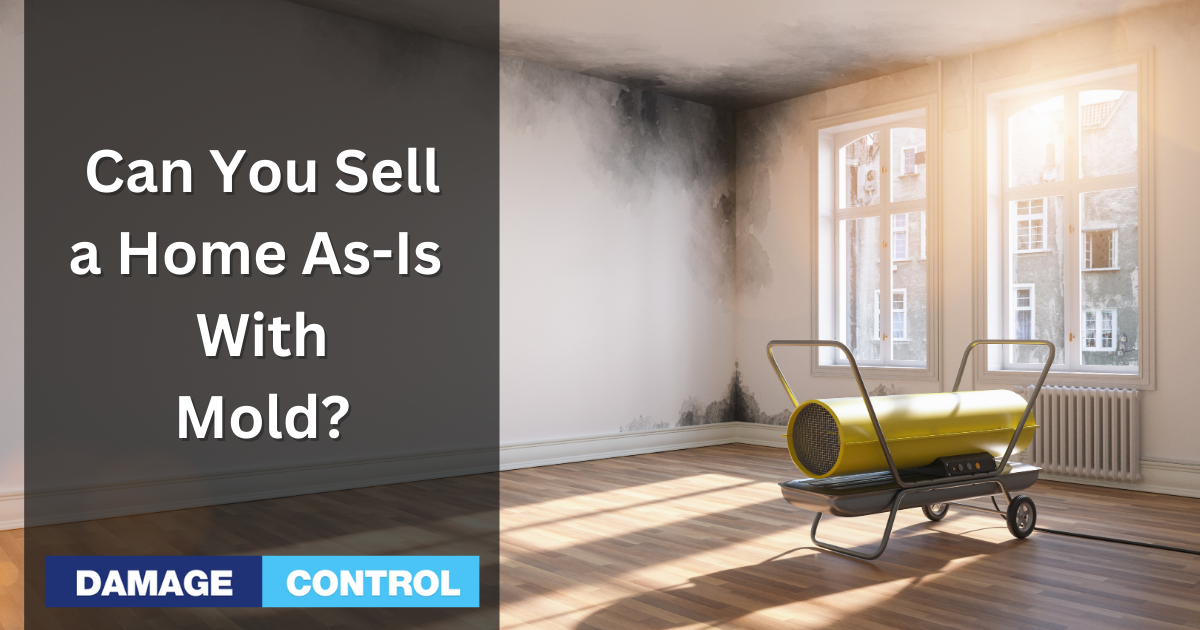Mold is sneaky. It hides in damp corners, under carpets, and behind wallpapers. But when it comes to selling a house, mold isn't something you can just sweep under the rug. In fact, it's a big concern for many homeowners. Can you sell a house “As Is” with mold? Is it even legal?
Buckle up, my friends! We're about to dive into the world of mold and real estate to answer these burning questions and more. So, stick around and let's unveil the facts and strategies you need to know!
What Does “As Is” Mean in Real Estate?
Definition of “As Is”
“As Is” is a term you might've heard before. But what does it really mean? In real estate lingo, “As Is” means selling a property in its current condition. In other words, the seller won't make any repairs or improvements before the sale. The buyer accepts the house with all its flaws and quirks, warts and all!
The implications of selling a house “As Is”
Selling a house “As Is” can be a double-edged sword. On one hand, it saves you time and money on repairs. You won't have to worry about fixing leaky faucets or patching up cracked walls. On the other hand, buyers might be wary of taking on a house with potential issues. They could offer you less money or pass on your house altogether.
Disclosure requirements in “As Is” sales
Just because you're selling “As Is” doesn't mean you can keep mum about problems. Nope, you still need to be upfront about any known issues, including mold. This is called “disclosure.” And while disclosure laws vary by state, it's generally a good idea to play it safe and be honest. Trust me, you don't want to end up in a legal pickle down the road!
Identifying Mold in Your Home
Common types of mold found in homes
Mold comes in all shapes and sizes, but some types are more common in homes than others. Here are a few usual suspects:
- Aspergillus: Loves damp, dusty places like basements and attics.
- Cladosporium: Enjoys growing on fabrics, carpets, and wallpapers.
- Penicillium: Often found on water-damaged materials, like drywall and insulation.
- Stachybotrys chartarum: Also known as “black mold,” this bad boy thrives in extremely damp areas.
How to detect mold in your home
Ready for a mold hunt? Keep an eye out for these telltale signs:
- Musty odors: If something smells off, mold lurks nearby.
- Discoloration: Mold can appear as black, green, or even pinkish spots on surfaces.
- Allergic reactions: Sniffling, sneezing, or itchy eyes? Mold might be the culprit.
Don't forget to check hidden spots, like under carpets, behind wallpapers, and inside cabinets. Mold can be sneaky, remember?
When to call a professional mold inspector
Sometimes, finding mold can be like searching for a needle in a haystack. If you suspect mold but can't find it, don't sweat it! Call in a professional mold inspector. These experts have the tools and know-how to track down even the most elusive mold colonies. Plus, they can advise you on the best course of action to tackle the problem.
The Legal Implications of Selling a House with Mold
 Disclosure laws regarding mold
Disclosure laws regarding mold
Before selling a house with mold, knowing your legal responsibilities is crucial. As mentioned, you must disclose any known mold issues to potential buyers. Disclosure laws vary from state to state, but it's always better to err on the side of caution. So, spill the beans about mold and save yourself from potential headaches!
Potential legal consequences of non-disclosure
You could be in hot water if you do not disclose mold issues. Buyers might sue you for damages, and you could pay hefty legal fees and compensation. It's not a pretty picture, right? So, it's best to be upfront and honest about mold from the get-go.
How to protect yourself from legal issues
Want to stay out of legal trouble? Follow these simple tips:
- Be transparent: Disclose all known mold issues to potential buyers.
- Document everything: Keep records of any mold inspections, treatments, or repairs.
- Work with professionals: Consult with a real estate attorney and a mold expert to ensure you meet all legal requirements.
By being proactive, you can minimize the risk of legal problems and make the selling process smoother.
How Mold Affects the Value of Your Home
The impact of mold on property value
Let's face it: mold can be a real buzzkill for potential buyers. When people see mold, they often think of health risks and costly repairs. As a result, the value of your home could tank. Buyers might try to negotiate a lower price or lose interest altogether.
Factors that influence the value of a home with mold
Several factors can affect the value of a home with mold:
- The severity of mold issue: The more extensive the mold infestation, the bigger the impact on your home's value.
- Type of mold: Some types, like black mold, can be more harmful and might lower the value further.
- Location of mold: Mold in hard-to-reach or high-traffic areas might make buyers more apprehensive.
Buyer expectations when purchasing a home with mold
When buying a home with mold, buyers often have certain expectations. They might want a discount to cover the cost of mold remediation or ask for repairs before the sale. Be prepared for these requests, and work with the buyer to reach a fair agreement. Remember, a little compromise goes a long way!
Preparing Your Home for Sale with Mold
Assessing the severity of mold in your home
Before putting your house on the market, it's essential to know the extent of the mold problem. Is it just a small patch in the bathroom or a full-blown infestation in the basement? Knowing the severity will help you make informed decisions about pricing and remediation.
Determining the cost of mold remediation
Next, figure out how much it would cost to fix the mold issue. Get quotes from professional mold remediation companies or research DIY solutions. Keep in mind that extensive mold problems might require a more significant investment.
Deciding whether to remediate mold before selling
Now comes the big question: should you tackle the mold before selling or sell “As Is”? Consider these factors:
- Budget: Can you afford the cost of mold remediation?
- Time: Do you have time to address the mold issue before selling?
- Market conditions: Are you in a buyer's or seller's market? This might affect your decision.
Ultimately, weigh the pros and cons and decide what's best for your situation. Remember, there's no one-size-fits-all answer here!
Mold Remediation Options
Professional mold remediation services
Hiring a professional mold remediation company can be smart, especially for severe mold problems. These experts have the tools and know-how to tackle mold effectively and safely. Plus, they can provide documentation to show potential buyers that the issue has been resolved.
DIY mold remediation techniques
Feeling handy? You can try some DIY mold remediation methods for smaller mold issues:
- Vinegar: Spray diluted vinegar on moldy surfaces, let it sit for an hour, then wipe clean.
- Baking soda: Mix a solution of water and baking soda, apply it to the mold, scrub, and rinse.
- Hydrogen peroxide: Spray 3% hydrogen peroxide on mold, let it sit for 10 minutes, then scrub and wipe clean.
Always wear protective gear and ensure proper ventilation when dealing with mold!
Pros and cons of various mold remediation methods
When deciding between professional services and DIY techniques, consider the pros and cons:
- Professional services: These are effective for severe mold issues but can be costly.
- DIY techniques: Budget-friendly and suitable for minor mold problems but not as effective for extensive infestations.
Choose the mold remediation method that best suits your needs and budget.
Conclusion: Selling a House with Mold Is Possible
So, can you sell a house “As Is” with mold? The answer is a resounding “yes”! While it might take more effort, patience, and negotiation, finding a buyer willing to tackle a mold issue is possible. By being transparent about the mold problem, addressing buyer concerns, and highlighting the positive aspects of your home, you can successfully sell your house and move on to your next adventure.
It's best to remediate it by professionals if you intend to sell the home.
Frequently Asked Questions (FAQs)
Is it illegal to sell a house with mold?
No, it's not illegal to sell a house with mold, as long as you disclose the issue to potential buyers. Disclosure laws vary by state, but it's always a good idea to be honest about any known mold problems.
Can mold affect my home's value?
Yes, mold can negatively impact the value of your home. Buyers might offer a lower price or lose interest due to concerns about health risks and repair costs.
Should I fix the mold issue before selling my house?
It depends on your budget, time, and the severity of the mold problem. Weigh the pros and cons of mold remediation before making a decision. You might fix the issue or sell the house “As Is.”
How do I disclose mold issues to potential buyers?
Be upfront about any known mold issues in your property listing and during discussions with potential buyers. Provide documentation of mold inspections, treatments, or repairs, if available.
What can I do if a buyer offers a low price due to mold?
Be prepared to negotiate with potential buyers. Counter their offer with a reasonable price that accounts for the cost of mold remediation and the overall value of your home.

